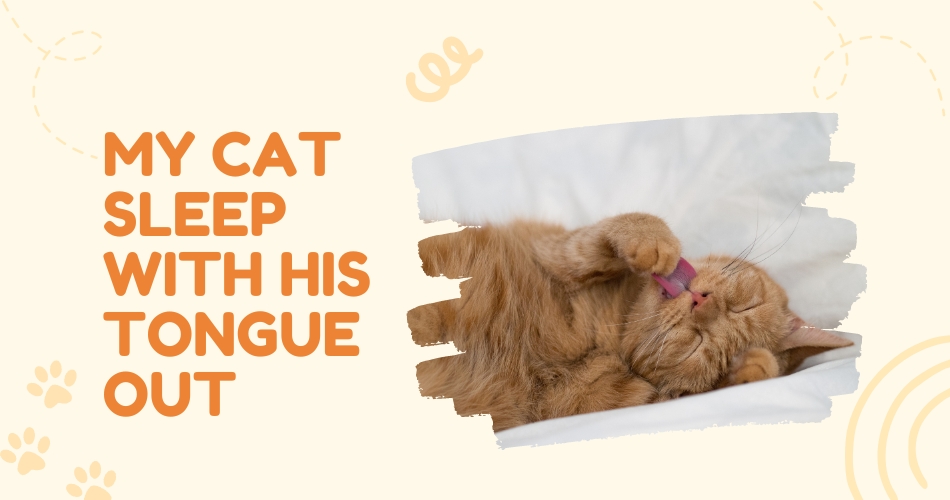Cats display various sleeping positions and spots. Your adorable feline companion might slumber on their back, sleep at the foot of your bed, or they might rest and sleep on your lap — and that’s so loveable, isn’t it? However, your curiosity also might intrigue you to ask “Why does my cat sleep with his tongue out?”
The reasons behind cats sleeping with their tongue out can indicate various factors, ranging from relaxation to enlarged tongue issues. This is why, as a caring cat parent, you might find yourself wondering, “Is it normal for my cat to sleep with its tongue out?”
Well, don’t get worried. Just go through this blog to make yourself clear about why your cat is sleeping with their tongue out.
18 Reasons Why Do Your Cats Sleep With Their Tongue Out
Cats are fascinating creatures, and it is not uncommon to notice that sometimes they fall asleep with their tongues sticking out. It might seem strange, but there are actually some interesting reasons behind this adorable behavior.
Let’s explore 18 reasons why your furry friend might snooze with their tongue out:
1. Forget to Pull Their Tongues Back In
Imagine the comical scenario when a cat dozes off and forgets to retract its tongue back into its mouth. Similar to how we occasionally let our mouths hang open during sleep, cats, too, can sometimes succumb to such sleep-induced forgetfulness.
2. Something Stuck to Their Tongue
Have you ever seen your cat’s tongue with a small piece of food stuck to it? Cats really like to clean themselves, but sometimes a tiny bit of food can get stuck on their tongue. When this happens, they might not even notice it and just keep sleeping.
3. When Muscles are Relaxed
Just like human bodies, a cat’s muscles experience relaxation during deep sleep. This includes the muscles responsible for maintaining their tongue within their mouths. Hence, in the depths of their tranquil sleep, the tongue might find its way out, presenting an adorable and innocent sight.
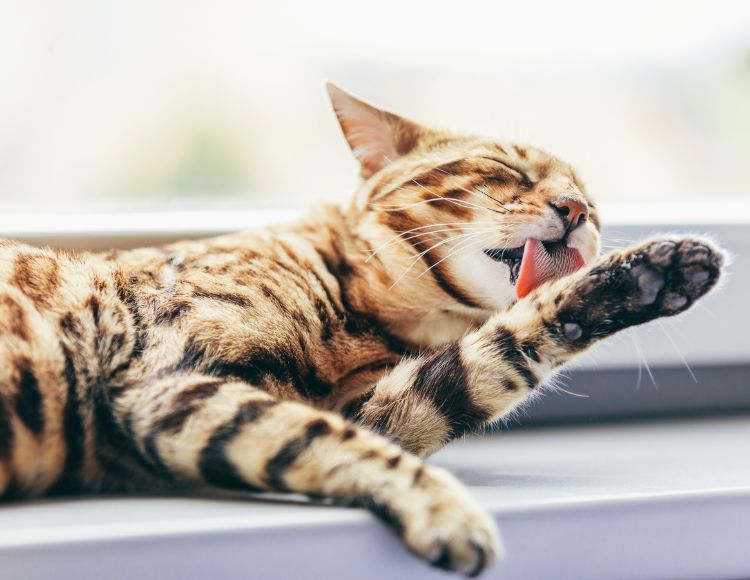
4. Dreaming and Deep Sleep Triggers
Cats, like all living creatures, have sleep cycles, including rapid eye movement (REM) sleep, which is associated with dreaming. During these dream-filled states, their bodies might become so deeply relaxed that their tongues accidentally make their way out, apparently chasing dreams of their own.
5. Swollen Tongue
Imagine a scenario where a playful feline indulges in a bit too much rough-and-tumble or perhaps encounters an unexpected irritation. Such instances can lead to temporary tongue swelling. Consequently, they may sleep with their tongues extended an unintentional result of their earlier adventures.
6. Stress Reliever
Much like how we sometimes find comfort in curling up under a warm blanket, cats have their own peculiar methods of comforting themselves. Sleeping with their tongues out may provide an oddly calming sensation, helping them unwind from the stresses of the day.
7. Health Issues
Cats, like humans, may occasionally face health challenges. These could range from minor discomforts to more serious concerns. Some of these issues might lead to sleeping with tongues out as a symptom or a coping mechanism.
8. Dental or Tongue Issues
Imagine if a cat’s mouth experiences discomfort due to dental problems, such as aching teeth or inflamed gums. Under such circumstances, it might feel more comfortable to sleep with their tongues out, relieving the pressure on their mouths.
9. Sleep Position Variations
Cats are really good at bending and curling their bodies when they sleep. They can look like they’re in strange and comfy positions at the same time. Sometimes, these positions might make their tongues stick out a little bit while they sleep. It’s a funny and cute part of how they relax.
10. Temperature Regulation
Cats are naturally equipped to regulate their body temperature, and they utilize their tongues as a means of heat dispersion. As they relax during sleep, their tongues might protrude. This aids your cats in the cooling process to ensure optimal comfort.
11. Respiratory Infection
Picture a scenario where a cat finds itself battling a respiratory infection. Breathing might become slightly compromised, and a relaxed tongue might facilitate easier airflow, providing a sense of relief as they drift into sleep.
12. Periodontal Disease
Periodontal disease, a common affliction in cats, can lead to gum discomfort and oral health issues. Consequently, a cat may adopt a position with its tongue gently resting outside its mouth, seeking respite from the discomfort within.
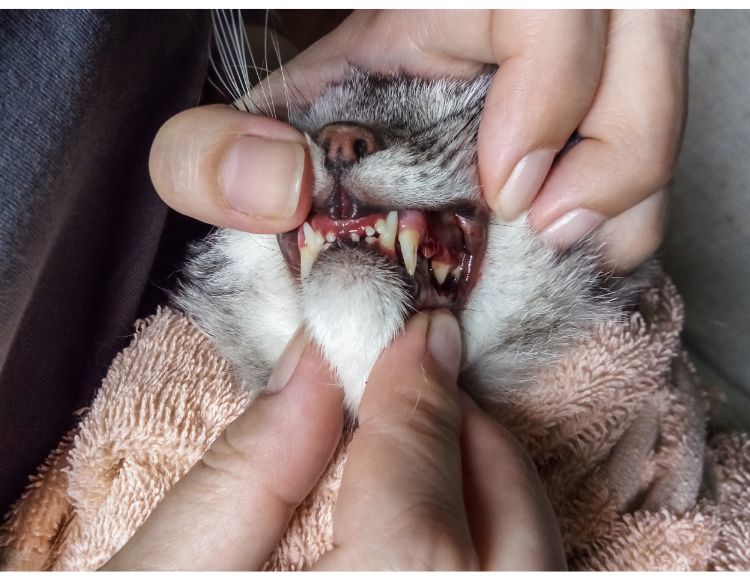
13. Neurological Issue
Cats’ complex nervous systems sometimes encounter glitches, leading to unusual behavior. In certain cases, a neurological hiccup might result in a cat sleeping with its tongue adorably sticking out, an adorable yet unwilling outcome.
14. Vomiting
Sometimes, your feline companion can feel a bit sick or nauseous. In anticipation of a potential need to vomit, the feline might instinctively position its tongue outside its mouth as it readies itself for a bodily purge.
15. Age Indulgence
As cats mature and transition into their golden years, they may develop new behaviors and preferences. The act of sleeping with a tongue open could be a charming quirk that displays as they grow older.
16. For Grooming
Cats are really good at cleaning themselves, and their tongue is like a special tool for them. Sometimes, when they’re giving themselves a bath, they might get so relaxed that they fall asleep with their tongue sticking out a little bit. It’s like they’re sleeping while doing their grooming at the same time!
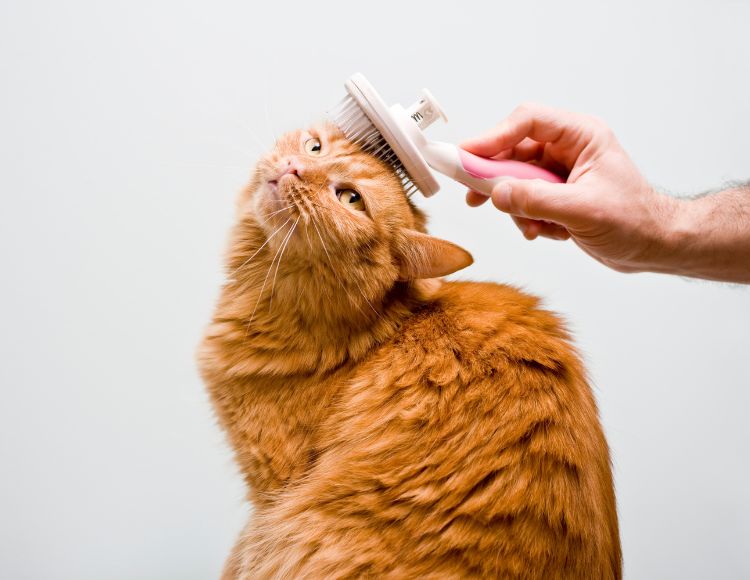
17. Sleep Environment Comfort
The surroundings in which cats choose to rest can influence their sleeping postures. A particularly cozy and inviting environment might entice a cat into a relaxed state, driving their tongues to peek out as they doze.
18. The Flehmen Response to Cats
Cats possess a unique and intriguing way of experiencing scents through a behavior known as the Flehmen response. This involves curling back their lips and exposing their teeth, often accompanied by an extended tongue. When they encounter an alluring or captivating scent, their tongues might join in on the olfactory.
If I recapitulate, in the captivating world of feline behavior, the charming sight of a cat sleeping with its tongue out adds yet another layer of enchantment. From sweet forgetfulness to complex physiological responses, the reasons behind this adorable behavior reveal our beloved furry friends’ complex and fascinating nature.
Reason Behind Your Cat Sticks His Tongue Out for Long Periods
Cats stick out their tongues and sometimes forget to put them back because they’re picking up smells on their tongue. They transfer these smells to the top of their mouth.
Also, cats have a special organ called the vomeronasal organ that helps them do this. With this organ, they can learn about other cats nearby, especially whether they’re ready to have kittens. This is because they can pick up special scents called pheromones.
These scents tell the cat if another cat is a boy or a girl if they’re old enough to have kittens, and if a girl cat is ready to have babies.
Even if a cat has been neutered, it will still stick out its tongue and do this smell-catching thing. They can still learn about other cats and what’s happening in their surroundings using their special organ.
Reasons Behind Your 4-Month-Old Kitten’s Tongue Stick Out All The Time
There are a few reasons why your little kitten’s tongue might be sticking out all the time. One reason could be that they were born with a congenital defect called ankyloglossia, also known as “tongue-tie” where the tissue holding their tongue is too tight. This can stop their tongue from moving around like it should.
Another reason might be that they have a problem with their teeth, like a sore spot or infection, which makes their tongue hurt when it’s inside their mouth.
Or it could be that your kitten is just growing really fast right now, and their mouth and tongue are getting stronger. To find out why this is happening, it’s a good idea to visit a veterinarian.
They will look at your kitten’s mouth and tongue and figure out what’s causing the trouble. Then they can help decide the best way to make your kitten feel better.
Is It Normal For Cats To Sleep With Their Tongues Out?
Absolutely! Most of the time, it’s completely fine. You love your cat and you might be wondering if it’s okay, don’t worry – it’s actually exquisitely adorable. An expert named M. Leanne Lilly from Ohio State University says it’s normal for cats to stick their tongues out a little (they call it “blip”), as long as your cat seems happy and not like something is bothering them (Via Rover).
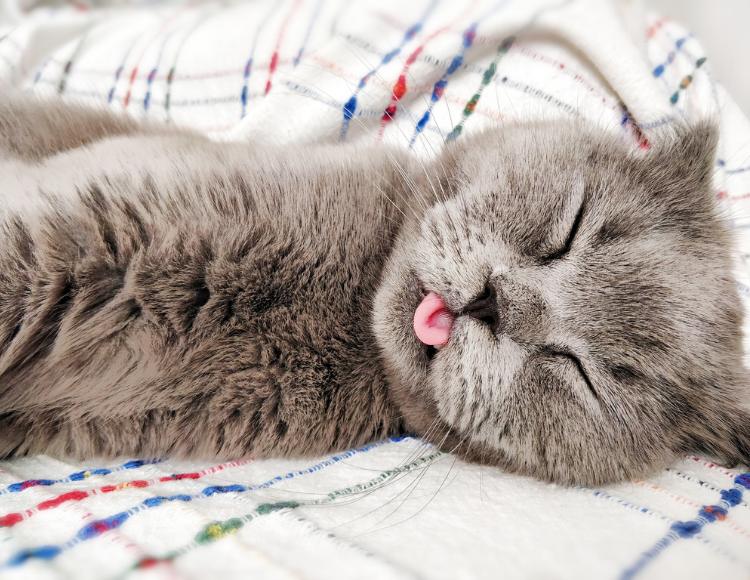
But if you notice anything strange or your cat keeps sticking their tongue out all the time when they sleep, then it’s a good idea to talk to a vet, just to be safe.
We would suggest you consult a vet if your cat is exhibiting the following signs along with the “tongue-out” sleeping habit:
- Difficulty Breathing
- Excessive Drooling
- Lethargy or Weakness
- Change in Behavior
- Persistent Blepping
- Gagging or Choking
Advice for Cat Owners When Their Cats Sleep with Their Tongue Hanging Out
What if your cat isn’t simply sleeping with their tongue out due to normal behavior? They could be experiencing health issues or even sleep deprivation. As a responsible cat owner, you should make sure your cat has the proper sleeping environment and all their other needs met.
Here is some advice for cat parents to help make the ‘tongue-out’ sleeping habit more comfortable and appropriate for their beloved feline companions:
Creating a Cozy Sleep Environment
Ensure your cat has a comfortable and quiet sleeping space with soft bedding and minimal disturbances. This can promote better sleep and reduce the likelihood of tongue-out sleeping due to discomfort.
Keeping Your Cat Hydrated
Proper hydration is super important for cats. A general guideline is to provide 4 ounces of water for every 5 pounds of a cat’s healthy body weight each day. For instance, an average 10-pound cat should aim to drink approximately one cup of water daily (Via.
Cornell Feline Health Center). Make sure your cat has access to clean, fresh water at all times. Dehydration can lead to unusual sleeping habits. Regular Dental Checkups
Dental issues can contribute to tongue-out sleeping. Schedule regular veterinary visits to maintain your cat’s oral health and catch any problems early. Recognizing Signs of Discomfort
Be attentive to any changes in your cat’s behavior, eating habits, or overall demeanor. If your cat seems uncomfortable or exhibits other unusual signs, consult a veterinarian to address potential health concerns.
Frequently Asked Questions (FAQs) On Cat’s ‘Tongue-Out’ Sleeping Habit
What Does a Cat Blep Mean?
“Blep” is when a cat’s tongue sticks out a little, often due to relaxation or mild sleepiness. It’s usually normal behavior and can be cute!
Should I Be Concerned If My Cat Sleeps With His Tongue Out Regularly?
Occasional “tongue-out” sleep is usually fine. However, if it becomes constant or is accompanied by distress, consult a vet.
Should I Wake Up My Cat If I Notice His Tongue Sticking Out During Sleep?
Generally, it’s best to let sleeping cats be. However, if the tongue is stuck or your cat appears in discomfort, gentle wake-up may be necessary.
When Should You Be Concerned About Your Cat Sticking Their Tongue Out?
If it’s persistent, accompanied by odd behavior, or interferes with breathing, consult a vet for a thorough evaluation.
What Triggers Cats to Drool and Hang Their Tongue Out?
Drooling and bleaching can be due to excitement, dental issues, nausea, or even stress. the vet can determine the cause and prescribe proper medication.
Is it safe for my cat to sleep with its tongue out for extended periods?
Cats may naturally sleep with tongues out briefly. Extended periods could indicate discomfort, health issues, or poor sleep quality; consult a vet.
Conclusion: Figuring Out Why Your Cat Sleeps with Its Tongue Out
Cats are amazing creatures with lots of interesting habits. One appealing thing they do is sleep with their tongues sticking out. It might look funny, but there are good reasons for it.
Sometimes, cats stick out their tongues just because they’re relaxed and comfy. Other times, it could be because they forgot to put their tongue away while falling asleep. Our furry friends are pretty cool; this is just one more way they show it!
If your cat does this sometimes, there’s usually nothing to worry about. But if it happens a lot and you’re concerned, it’s a good idea to talk to a vet. They can make sure your cat is healthy and happy.

